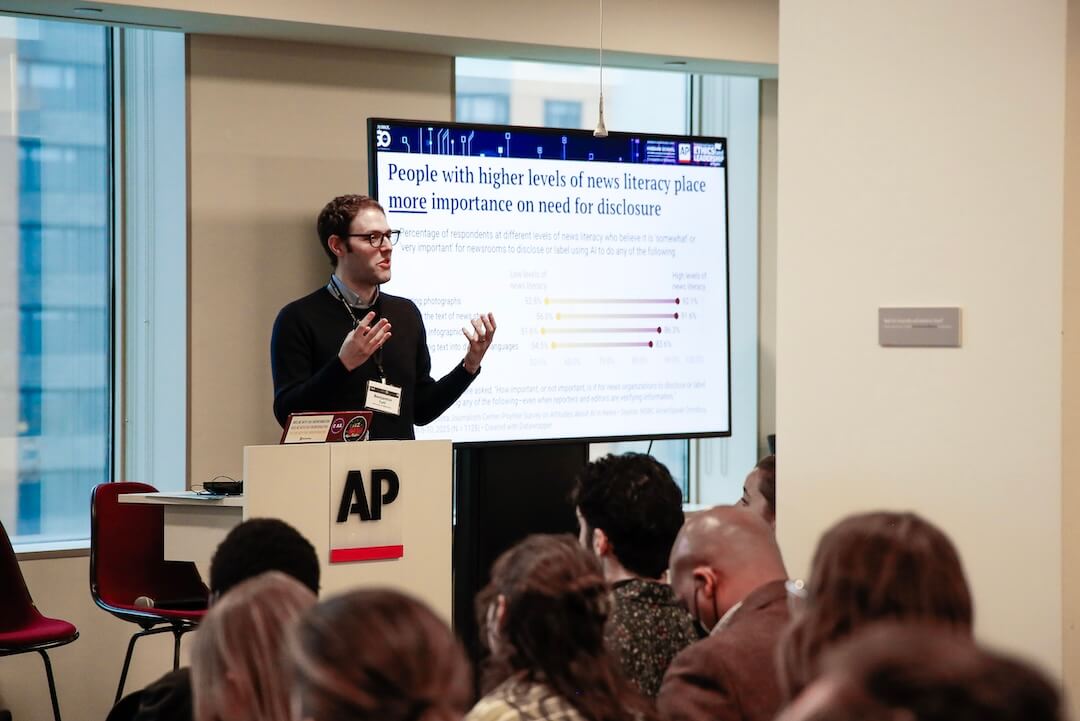 Covering COVID-19 is a daily Poynter briefing of story ideas about the coronavirus and other timely topics for journalists, written by senior faculty Al Tompkins. Sign up here to have it delivered to your inbox every weekday morning.
Covering COVID-19 is a daily Poynter briefing of story ideas about the coronavirus and other timely topics for journalists, written by senior faculty Al Tompkins. Sign up here to have it delivered to your inbox every weekday morning.
A candidate for governor in Minnesota is suggesting the state repeal a law that forbids gas stations from selling gasoline for less than it costs them. Like many states, Minnesota has a law that says stations must sell gas for at least eight cents more than they bought it. Most states have similar laws that bar stores from selling eggs, milk, tobacco and alcohol at a loss, too.
WISN TV reports that a Woodman’s Market in Waukesha is facing two lawsuits for $80,000 each. The suits allege that the Woodman’s sold gas below cost, which is against Wisconsin’s Unfair Sales Act. The suits were brought by companies operating two nearby gas stations, a Shell and a BP. Woodman responded that it could legally sell the gas below cost to compete with a Costco located six miles away.
It might help for you to see what the Wisconsin law says, with the background that many states have similar laws. Wisconsin’s law says:
Commonly referred to as the “Minimum Markup Law,” the Unfair Sales Act prohibits selling items of merchandise below cost. The law states that “the practice of selling…below cost to attract patronage is a form of deceptive advertising and an unfair method of competition in commerce…” Specifically, the law defines cost as:
For all merchandise except alcoholic beverages, tobacco products, and motor vehicle fuel, cost to either wholesalers or retailers is defined as invoice cost or replacement cost, whichever is lower, less all trade discounts, plus any excise taxes and any cost incurred for transportation and any other charges not otherwise included in the invoice cost or replacement cost of the merchandise.
For alcohol and tobacco products the definition of cost also includes a 3% cost of doing business markup for wholesalers and a 6% cost of doing business markup for retailers. Cost for wholesalers who operate retail outlets or retailers who purchase directly from the manufacturer includes a 9.18% markup (3% plus 6% compounded).
Penalties for violating the Unfair Sales Act may include a civil forfeiture of $50 to $500 for the first violation and $200 to $2500 for each subsequent violation. Sellers of motor vehicle fuel and/or tobacco products may file a private cause of action to seek damages if they are injured by a competitor’s price.
Exceptions to the law are made to allow for matching a competitor’s price, clearance and final liquidation sales, sales of damaged merchandise and perishables, contracted governmental institution sales and for merchandise sold to charitable or relief agencies.
A 2004 study found that states that have sales-below-cost (SBC) laws that prohibit gas stations from selling fuel below costs have lower overall prices. The reason, the study says, is that such states tend to have more retailers and the competition keeps prices in check. But it is not hard to find other studies that say SBC laws keep prices artificially high.
States have imposed and repealed and reimposed SBC laws for decades. I found one 1939 reference to such laws in 21 states.
The New Jersey Gas and Convenience Store Association points out:
“New Jersey currently has laws which prohibit the sale of gasoline below cost. These laws are absolutely essential to maintaining a functioning marketplace in the state.
Any elimination of these laws would allow big box chains to undercut smaller retailers and force these small businesses to close down. Once the competition is eliminated these chains would be able to dramatically increase gasoline prices on the consumer.
The current statute prohibiting below cost selling has been in place for decades and it was passed to prevent oil companies and large operators from driving smaller independents out of business. NJGCA opposes attempts to limit or eliminate New Jersey’s prohibition on below cost selling.
The Federal Trade Commission says that a retailer may legally sell below cost if they have to do so to match a competitor’s legally set low price:
Pricing below a competitor’s costs occurs in many competitive markets and generally does not violate the antitrust laws. Sometimes the low-pricing firm is simply more efficient. Pricing below your own costs is also not a violation of the law unless it is part of a strategy to eliminate competitors, and when that strategy has a dangerous probability of creating a monopoly for the discounting firm so that it can raise prices far into the future and recoup its losses. In markets with a large number of sellers, such as gasoline retailing, it is unlikely that one company could price below cost long enough to drive out a significant number of rivals and attain a dominant position.
The ProgressiveGrocer explains:
Most states provide for both criminal and civil penalties for below-cost pricing violations. Most states also allow private lawsuits for actual damages, with some states explicitly allowing treble damages. Many states also allow their attorneys general to bring enforcement actions. Enforcement in recent decades has been fairly low, with the exception of California, Hawaii, Michigan and Wisconsin.
Gas station clerks get an earful about prices
Spend a day with a clerk at a gas station or convenience store and you will hear how people feel about $5 per gallon gas, that’s for sure.
In a period of two months, more than 300 people sent formal complaints to Connecticut’s attorney general complaining about gas prices. Some of the complaints accused stations of price gouging. A Pennsylvania man faces a series of charges after he decorated gas pumps with stickers blaming President Joe Biden for high prices. Of course, it is the attendant who has to go out and peel the stickers off the pumps.
The gas attendants have also noticed a change in customer interactions, and to little surprise, it’s mostly an expression of frustration.
“They do project that — and they know it’s not our fault,” Plunkett said. “We’re doing the best we can.”
“They’re more conserved,” 76 Gas attendant John Dallas said. “They’re quieter. They’re not as open and just happy about just being here.”
The price hikes also have given rise to bizarre instances of fuel theft. A San Diego couple called police after they found a hole drilled in the bottom of a car, emitting a steady stream of gas, according a March 21 report from CBS8. Similar incidents have been reported in Memphis, Las Vegas and other cities.
Three Florida men were arrested and face racketeering charges on accusations of stealing thousands of gallons of diesel directly from gas stations, transporting it in 300-gallon “gasoline bladders” and reselling it, according to Newsweek.
Airline ticket inflation
Remember when you look at this graphic, you are looking at prices over time. So, 38% is a rise of less than 2% over 30 years. It is hard to keep that in mind when something rises in price quickly.
Some of the hottest inflation categories in May
I trolled through the May Consumer Price Index figures and saw a few things that could result in interest stories:
- The inflation rate for electricity prices rose to 1.3% in May. That is almost twice the rate hike from the month before and 12% year to year.
- New vehicle inflation is unchanged and running at 12.6% a year.
- Used car prices cooled down in recent months but were back at 1.8% in May. That puts the inflation rate for used vehicles at 16% year to year.
- Food prices rose more in May than in April, and meat, poultry and fish costs are leading the way.
Do you ever check the regional and state CPI figures? Here they are. You will see that in some states you can also get major city CPI data. For example, you will find the inflation rate in Baltimore is higher than the national average.
The Wall Street Journal reports:
Kraft Heinz notified retailer customers this past Monday that it would raise prices in August on items ranging from Miracle Whip and Classico pasta sauce to Maxwell House coffee products and some deli meat.
Cory Onell, chief sales officer at Kraft Heinz, wrote in the memo to retailers that inflation continues to affect the economy and shape consumption patterns. Costs continue to rally and the persistence of increases makes it necessary to announce price changes, he wrote.
COVID hospitalizations are rising
Cases are rising, hospitalizations are rising, and seniors are being hospitalized at a higher rate. The pandemic keeps rolling on. We are averaging 100,000-plus new cases a day, which means we are in the same place we were in August of last year and the same rate we measured in November 2020.

(CDC)
If you look at the data from wastewater samples — which have reliably detected the presence of COVID-19 before testing or hospitalization numbers reflect infections — you will see there is a lot of virus moving through the U.S. right now, and usually we think of summer as the season where we would see the least outbreaks as people are outdoors.

(CDC)
We’ll be back tomorrow with a new edition of Covering COVID-19. Are you subscribed? Sign up here to get it delivered right to your inbox.









